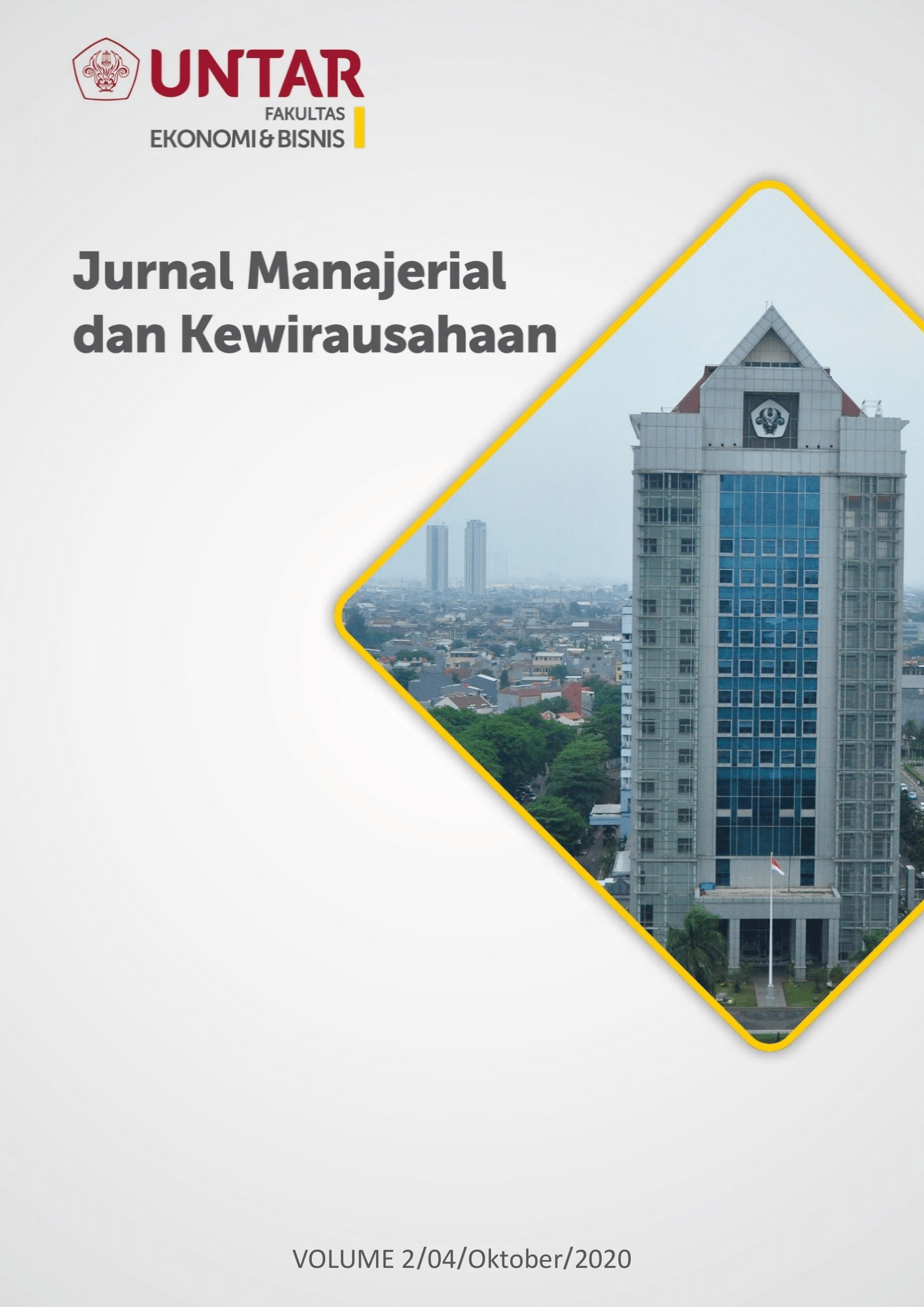Pengaruh Pengendalian Diri, Literasi serta Perilaku Keuangan Terhadap Kesejahteraan Keuangan
Main Article Content
Abstract
The purpose of this study is to determine whether the financial well-being of financial management student at Tarumanagara University can be measured through financial behavior, where the level of financial behavior in this study is seen based on self-control and financial literacy. This research uses primary data through the process of collecting data by sharing questionnaires online using google forms questionnaire with a non-probability sampling method of the type of convenience sampling with a total of 150 financial management student at Tarumanagara University. The data analysis technique used is Structural Equation Modeling (SEM) with Smart-PLS program version 3.2.8. The results of this study show that there is a positive and significant influence between self-control, literacy, and financial behavior towards financial well-being.
Tujuan penelitian ini adalah untuk mengetahui apakah kesejahteraan keuangan mahasiswa manajaemen keuangan Universitas Tarumanagara dapat diukur melalui perilaku keuangannya, dimana tingkat perilaku keuangan dalam penelitian ini dilihat berdasarkan pengendalian diri dan literasi keuangan seseorang. Penelitian ini menggunakan data primer melalui proses pengumpulan data dengan cara membagikan kuesioner secara online menggunakan google form dengan metode non-probability sampling berjenis convenience sampling dengan total 150 responden mahasiswa manajemen keuangan Universitas Tarumanagara. Teknik analisis data yang digunakan adalah Structural Equation Modeling (SEM) dengan program Smart-PLS versi 3.2.8. Hasil dari penelitian ini menunjukkan bahwa terdapat pengaruh positif dan signifikan antara pengendalian diri, literasi, serta perilaku keuangan terhadap kesejahteraan keuangan.
Article Details
This work is licensed under a Jurnal Muara Ilmu Ekonomi dan Bisnis Creative Commons Attribution-ShareAlike 4.0 International License.,/p>
References
C. F. P. B. (2015). Financial Well Being: The Goal of Financial Education. January, 48. http://files.consumerfinance.gov/f/201501_cfpb_report_financial-well-being.pdf
(OJK), O. J. K. (2017). Laporan Kinerja Otoritas Jasa Keuangan 2017.
Ajzen, I. (1991). The theory of planned behavior. Organizational Behavior and Human Decision Processes. https://doi.org/10.1016/0749-5978(91)90020-T
Akben-Selcuk, E. (2015). Factors Influencing College Students’ Financial Behaviors in Turkey: Evidence from a National Survey. International Journal of Economics and Finance, 7(6), 87–94. https://doi.org/10.5539/ijef.v7n6p87
Arsanti, C., & Riyadi, S. (2019). Analisis Pengaruh Literasi Keuangan Terhadap Perilaku Keuangan Mahasiswa. 3(2), 110–122.
Fazli Sabri, M., Cook, C. C., & Gudmunson, C. G. (2012). Financial well? being of Malaysian college students. Asian Education and Development Studies, 1(2), 153–170. https://doi.org/10.1108/20463161211240124
Hair, J. F., Ringle, C. M., & Sarstedt, M. (2011). PLS-SEM: Indeed a silver bullet. Journal of Marketing Theory and Practice. https://doi.org/10.2753/MTP1069-6679190202
Hasibuan, B. K., Lubis, Y. M., & HR, W. A. (2018). Financial Literacy and Financial Behavior as a Measure of Financial Satisfaction. https://doi.org/10.2991/ebic17.2018.79
Henseler, J., Ringle, C. M., & Sinkovics, R. R. (2009). The use of partial least squares path modeling in international marketing. Advances in International Marketing. https://doi.org/10.1108/S1474-7979(2009)0000020014
Hirvonen, J. (2019). Financial behavior and well-being of young adults: effects of self-control and optimism Financial Behavior And Well-Being Of Young Adults: Effects Of Self Control And Optimism. University of Jyväskylä Jyväskylä School of Business and Economics Master’s. February.
Laily, N. (2016). Pengaruh Literasi Keuangan Terhadap Perilaku Mahasiswa Dalam Mengelola Keuangan. Journal of Accounting and Business Education. https://doi.org/10.26675/jabe.v1i4.6042
Moein Addin, M., Nayebzadeh, S., Kalantari Taft, M., & mohammadi Sadrabadi, M. (2016). Financial strategies and investigating the relationship among financial literacy, financial well-being, and financial worry. European Online Journal of Natural and Social Sciences, 2(3(s)), 1279–1289.
OECD. (2016). OECD/INFE International Survey of Adult Financial Literacy Competencies, 1–100.
Philippas, N. D., & Avdoulas, C. (2020). Financial literacy and financial well-being among generation-Z university students: Evidence from Greece. European Journal of Finance, 26(4–5), 360–381. https://doi.org/10.1080/1351847X.2019.1701512
Rachmawati, N., & Nuryana, I. (2020). Peran Literasi Keuangan dalam Memediasi Pengaruh Sikap Keuangan dan Teman Sebaya Terhadap Perilaku Keuangan. Economic Education Analysis Journal, 9(1), 166–181. https://doi.org/10.15294/eeaj.v9i1.37246
Rai, K., Dua, S., & Yadav, M. (2019). Association of Financial Attitude, Financial Behaviour and Financial Knowledge Towards Financial Literacy: A Structural Equation Modeling Approach. FIIB Business Review. https://doi.org/10.1177/2319714519826651
Setiyani, R., & Solichatun, I. (2019). Financial Well-being of College Students: An Empirical Study on Mediation Effect of Financial Behavior. KnE Social Sciences, 3(11), 451. https://doi.org/10.18502/kss.v3i11.4026
Strömbäck, C., Lind, T., Skagerlund, K., Västfjäll, D., & Tinghög, G. (2017). Does self-control predict financial behavior and financial well-being? Journal of Behavioral and Experimental Finance, 14, 30–38. https://doi.org/10.1016/j.jbef.2017.04.002
Sundarasen, S. D. D., Rahman, M. S., Othman, N. S., & Danaraj, J. (2016). Impact of financial literacy, financial socialization agents, and parental norms on money management. Advanced Science Letters.
Tsounis, N., & Aspasia, V. (2017). Advances in Applied Economic Research. Proceedings of the 2016 International Conference on Applied Economics (ICOAF). Advances in Applied Economic Research, Springer Proceedings in Business and Economics. https://doi.org/10.1007/978-3-319-48454-9
Vitt, L. A., Kent, J., Lyter, D. M., Siegenthaler, J. K., & Ward, J. (2000). Personal Finance and the Rush To Competence: Financial Literacy Education in the U.S. Personal Finance, January 2000, 1–234. https://doi.org/Fannie Mae Foundation: Washington DC
Vlaev, I., & Elliott, A. (2014). Financial Well-Being Components. Social Indicators Research. https://doi.org/10.1007/s11205-013-0462-0
Younas, W., & Farooq, M. (2019). Impact of Self-Control, Financial Literacy and Financial Behavior on Financial Well-Being. The Journal of Social Sciences Research, 5(51), 211–218. https://doi.org/10.32861/jssr.51.211.218
Zemtsov, A. A., Osipova, T. Y., & Osipova, T. (2015). WELLSO 2015 -II International Scientific Symposium on Lifelong Wellbeing in the World Financial Wellbeing as a Type of Human Wellbeing: Theoretical Review. https://doi.org/10.15405/epsbs.2016.02.49



